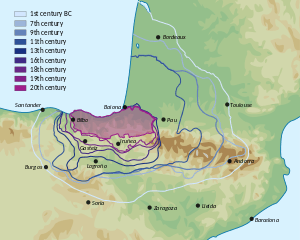History of the Basque language
Basque (/bæsk, bɑːsk/;[1] euskara [eus̺ˈkaɾa]) is a pre-Indo-European language spoken in the Basque Country, extending over a strip along eastern areas of the Bay of Biscay in Spain and France, straddling the western Pyrenees. It is classified as a language isolate, having no demonstrable genetic relation to any other known language, with the sole exception of Aquitanian, which is generally considered to be an ancestral form of Basque.[2][3]

Basque has been considered the last remnant of a wider, Western European linguistic stratum before Indo-European languages arrived in the area during the Iron Age.[4] The Roman period bears witness to the existence of several peoples, place-names and inscriptions showing names with Basque-like morphology and lexical roots around the Pyrenees. Basque has borrowed during its history loanwords and structures from neighbouring Celtic and Latin/Romance languages (adstratum), holding a dynamic interaction with them. Basque shows a receding geographical trend overall at least since the Early Middle Ages. During the last 400 years its geographical extent has been largely confined to seven districts, the Basque Country (Euskal Herria).
Basque venturers took their language overseas since the 16th century, especially into the Americas, where it came to be diluted in the larger, prevailing colonial languages, like Spanish, French, or English. Basque remained until the late-20th century a language steeped in oral tradition and little use in writing, with its first written book attested in 1545, the Linguae Vasconum Primitiae. Basque was never used for official documents, and came to be gradually excluded as an oral communication language from governing, educative, administrative bodies, and finally also from Church. During the 20th century, scholars, writers and activists endeavoured to develop a long-discussed aspiration to create a unified, formal standard, which finally crystallized in standard Basque (euskara batua) as of 1968.
See also
Notes
- "Basque". Oxford English Dictionary (3rd ed.). Oxford University Press. September 2005. (Subscription or UK public library membership required.); [bæsk] is the US pronunciation, in British English it is [bask] or [bɑːsk].
- Trask 1997, p. 35.
- Lakarra 2017, pp. 60–61.
- Trask 1997, p. 10.
References
- Lakarra, Joseba A. (2017). "Basque and the Reconstruction of Isolated Languages". In Campbell, Lyle (ed.). Language Isolates. London: Routledge. pp. 59–99.CS1 maint: ref=harv (link)
- Trask, Robert Lawrence (1997). The History of Basque. Psychology Press. ISBN 9780415131162.CS1 maint: ref=harv (link)